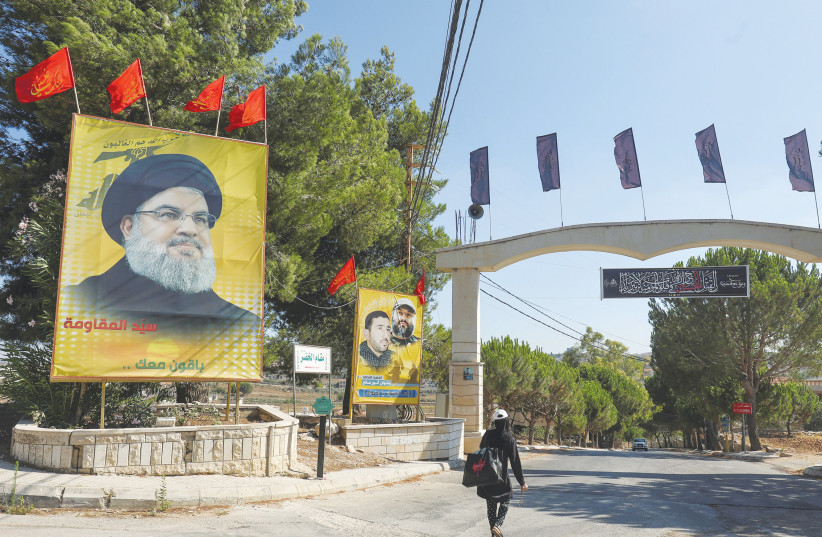If it weren’t for Hezbollah, Lebanon would have been part of the Abraham Accords, the head of the IDF’s Military Intelligence said on Monday.
“I am convinced that Lebanon would have been part of the Abraham Accords if not for Hezbollah,” Maj.-Gen. Aharon Haliva said at Reichman University’s Counter-terrorism conference in Herzliya. “Hezbollah is an organization that wears three hats: protector of the Shia community, an Iranian proxy financed and backed by Tehran, and the protector of Lebanon who took the Lebanese people hostage.”
Israel normalized ties with the United Arab Emirates, Bahrain, Morocco and Sudan with the signing of the Abraham Accords in 2020. Since then, ties between the countries have increased with bilateral defense agreements signed, over 150 meetings between security officials, dozens of joint exercises, and over $3 billion in defense industry cooperation. The chief of staff of Morocco’s military landed in Israel on Monday and was received at the Kirya Military Headquarters with an honor guard.
“I hope, for Nasrallah’s sake, that he does not underestimate the Israeli response if he decides to make a move.”
Maj.-Gen. Aharon Haliva
According to Haliva, Lebanon is like every other country where Iran has influence, such as Iraq, Yemen and Syria.

“They are at the bottom in every parameter of failed countries,” he said. “The people of Lebanon get up in the morning, try to turn on the electricity and it doesn’t turn on. The value of the currency is also in a terrible state. Life there is very difficult.”
Israel, on the other hand, “is a country with assets like water, technology and food in addition to military power. Arab countries are aware of this, and that’s what led to the Abraham Accords.”
Lebanon and Israel remain officially at war, and tensions have lately increased over the Karish gas rig and the maritime borders between the two countries.
“A Lebanese gas rig is an Israeli interest, and improving the economic situation of the Lebanese people is also an Israeli interest,” Haliva said. “The people of Lebanon also understand what the result of war would be.”
Haliva told the conference that the military has discussed the potential for escalation in the north with the political echelon. The IDF has also carried out large-scale exercises simulating war with Lebanon, including the Chariots of Fire drill, in which troops had trained in Cyprus.
“I hope, for [Secretary-General of Hezbollah Hassan] Nasrallah’s sake, that he does not underestimate the Israeli response if he decides to make a move,” warned Haliva. “Israel’s power is great, and I am sure that Hezbollah understands this. Nasrallah is a serious individual and knows what I’m talking about.”
Haliva, who spent years in Lebanon as a soldier and officer, said that Nasrallah calculates every decision he makes by remembering what happened during the Second Lebanon War.
Nevertheless, in the 16 years since the devastating 34-day war, Hezbollah, with Iran’s help, has increased its arsenal with 150,000 rockets and missiles aimed at the Israeli home front, along with attack drones and other advanced weaponry.
According to Haliva, the IDF believes that Nasrallah is highly regarded in Iran, and “is not a patron but a partner in making decisions vis-à-vis the Iranians. There is a likelihood that in certain events, Hezbollah and Nasrallah as its leader will join Iran’s circle of violence.”
Commenting on the increase in violence in the West Bank, Haliva warned that there could be attacks during the upcoming Jewish holiday season.
“The holidays are always a sensitive period, but I estimate that there is potential for significant incidents,” he said.
The IDF increased its presence in the West Bank following a wave of deadly attacks inside Israel, and has stepped up nightly arrest raids in cities like Jenin and Nablus. The raids have seen violent clashes and heavy gunfire from Palestinians against IDF troops. There has also been an increase in shootings against IDF targets and Israeli civilian vehicles.
As a result, more than 80 Palestinians have been killed by the IDF since the beginning of the year, a sharp increase from 2021.
While IDF Chief of Staff Lt.-Gen. Aviv Kohavi has placed blame for the increased violence on the Palestinian Authority, the Palestinians have blamed Israel.
“It is a Palestinian interest to lower the amount of terrorism in the area and stabilize the governance of the Palestinian Authority,” Haliva said. At the same time, “We need to do the right things to stabilize the PA. It is an Israeli security interest.”
